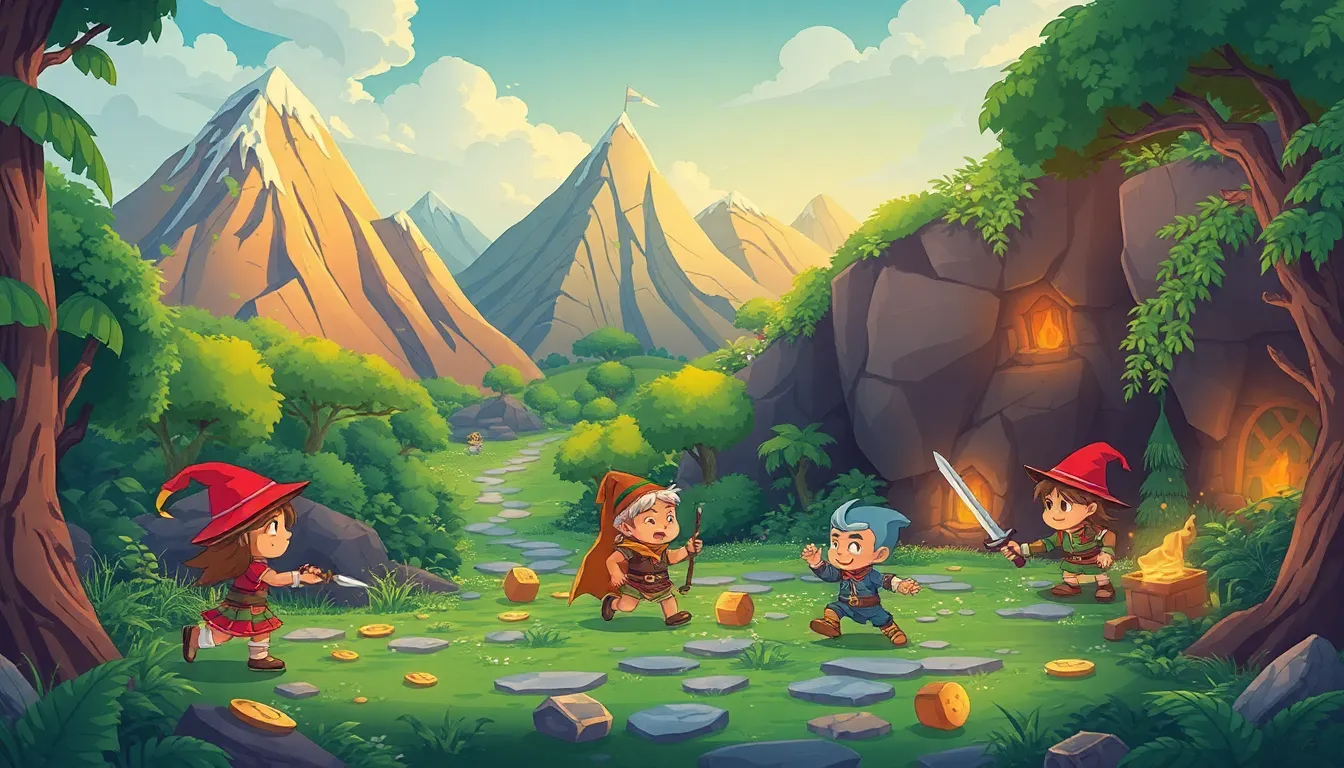Strategy games are like a mental gym where players flex their brain muscles while plotting world domination or outsmarting opponents. They blend intense decision-making with a sprinkle of luck, making every match an exhilarating rollercoaster ride. Whether it’s commanding an army, building an empire, or solving complex puzzles, these games offer a playground for the cunning and the clever.
From classic titles that have stood the test of time to modern masterpieces that push the envelope, the world of strategy gaming is vast and vibrant. Players dive headfirst into immersive worlds where every choice counts and victory is often just a clever maneuver away. So grab your thinking cap and prepare to outwit your foes, because the realm of popular strategy games is waiting for its next champion.
Table of Contents
ToggleOverview of Popular Strategy Games
Players engage with popular strategy games to enhance their tactical skills and decision-making. These games often blend critical thinking with elements of chance, creating an exhilarating experience for participants. Commanding armies and building empires showcases the variety in strategic gameplay, appealing to different tastes and preferences.
Real-time strategy games like “StarCraft II” demand quick thinking and fast reflexes. Players navigate complex scenarios while managing resources and commanding troops, often balancing offense and defense. Turn-based strategy games, such as “Civilization VI,” allow for a more thoughtful approach. Here, players can plan their moves and strategize without the pressure of real-time action.
Diversity exists not only in gameplay mechanics but also in themes. Historical settings dominate many titles, providing immersive backdrops for epic battles and empire-building. Additionally, fantasy-themed strategy games offer unique worlds filled with magic and mythical creatures, capturing players’ imaginations.
Mobile platforms have revolutionized accessibility to strategy games. Titles like “Clash of Clans” and “Plants vs. Zombies” introduce strategy to a broader audience through user-friendly interfaces and shorter play sessions. This evolution expands the genre’s reach, inviting casual gamers to enjoy strategic challenges.
Online multiplayer experiences enhance the excitement further. Competing against human opponents provides a dynamic and unpredictable element that bots cannot replicate. Successful players adapt to opponents’ strategies, making each match unique.
Overall, successful strategy games deliver a mix of planning, quick decision-making, and adaptability, ensuring that players remain engaged and challenged throughout their gaming experience.
Real-Time Strategy Games

Real-time strategy (RTS) games immerse players in fast-paced environments where quick decision-making and resource management are vital. These games challenge players to think on their feet and adapt to changing situations continuously.
Key Features
Critical aspects define real-time strategy games. Players manage resources, build units, and strategize under time constraints. Fast-paced action requires swift responses, distinguishing RTS from turn-based games. Interactive maps enhance strategic planning, while multiplayer modes foster competitive spirit. Cooperative gameplay encourages teamwork and collaboration among players. Frequent updates and expansions keep content fresh, ensuring long-term engagement.
Notable Titles
Several real-time strategy games have become iconic in the genre. “StarCraft II” remains a benchmark for its competitive balance and rich lore. “Age of Empires IV” captivates players with historical settings and diverse civilizations. “Warcraft III” combines strategy with role-playing elements, offering a unique experience. “Company of Heroes” stands out for its tactical depth and emphasis on cover mechanics. “Command & Conquer: Remastered” revitalizes a classic title, appealing to both new players and nostalgia-driven veterans.
Turn-Based Strategy Games
Turn-based strategy games focus on thoughtful planning and tactical execution, allowing players to make strategic decisions at their own pace. These games often involve managing resources, considering unit placements, and anticipating opponents’ moves.
Key Features
Strategic depth defines turn-based games, where each move counts. Players take turns to execute their plans, fostering a more analytical gameplay style. Resource management influences overall success, as players allocate their assets wisely. Game mechanics often include unit upgrades, territory control, and diplomacy elements, adding layers of complexity. Maps usually feature varied terrain, shaping tactical approaches. Multiplayer options provide opportunities to challenge others, enhancing engagement through competitive play.
Notable Titles
“Civilization VI” stands out as a classic, inviting players to build empires and rise to power over the ages. “XCOM 2” offers a gripping tactical experience, blending resource management with squad-based combat. “Fire Emblem: Three Houses” captivates gamers with its rich storytelling and character development. “Divinity: Original Sin 2” combines turn-based mechanics with a compelling narrative and cooperative gameplay. “Total War: Three Kingdoms” merges turn-based strategy with real-time battles, showcasing historical conflicts in a captivating manner. These titles exemplify the genre’s diversity and appeal.
Hybrid Strategy Games
Hybrid strategy games blend elements from various genres, offering unique gameplay experiences that challenge players in innovative ways. These games incorporate real-time and turn-based mechanics, providing both fast-paced action and thoughtful planning.
Key Features
Different styles of gameplay are central to hybrid strategy games. Players experience simultaneous turns where quick reactions are crucial, alongside phases that require strategic decision-making. Resource management demands attention to detail and foresight, encouraging players to balance offense and defense. The incorporation of evolving narratives often presents opportunities for branching strategies, keeping players engaged. Diverse unit types add complexity, making tactical positioning essential.
Notable Titles
“XCOM: Chimera Squad” stands out by merging turn-based tactics with real-time elements, creating a compelling approach in the XCOM universe. “Total War: Warhammer II” combines turn-based strategy with real-time battles, allowing for immersive tactical engagement on a grand scale. “Dawn of War III” blends traditional RTS mechanics with hybrid gameplay, enhancing the player experience with strategic depth. “Civilization: Beyond Earth” merges familiar Civilization elements with futuristic mechanics, presenting innovative twists on classic gameplay. Each title highlights the creativity and versatility present in hybrid strategy games, broadening their appeal to players.
Impact of Popular Strategy Games on Gaming Culture
Popular strategy games shape gaming culture significantly. They not only inspire competitive gameplay but also foster communities centered around strategic thinking and collaboration. Players engage in forums and online platforms, discussing tactics and sharing experiences. This interaction cultivates a sense of belonging among gamers.
Many successful titles drive innovation in game design. Mechanics introduced in games like “StarCraft II” and “Civilization VI” set industry standards. They influence other genres, encouraging the development of new gameplay elements. As a result, hybrid games emerge, blending strategy with action and role-playing components, appealing to a broader audience.
Accessibility plays a crucial role in the impact of these games. Mobile platforms facilitate easy access, allowing casual gamers to enjoy strategically complex titles. Popular games like “Plague Inc.” and “XCOM: Chimera Squad” reach players who might not engage with traditional console experiences. Their availability enhances community growth and cultural exchange.
Streaming platforms amplify the popularity of strategy games. Viewers enjoy watching skilled players execute tactics in real-time. This phenomenon creates a new layer of entertainment that emphasizes strategy and decision-making skills. Events like esports tournaments further highlight the competitive nature of these games, drawing large audiences and inspiring aspiring players.
Cultural references appear within popular media too. Themes from strategy games often resonate in television shows and movies, reinforcing their significance in contemporary culture. This presence makes strategy games not just a hobby but a recognized part of global entertainment.
Ultimately, popular strategy games lead to rich, diverse gaming culture. They challenge players on multiple levels, promoting critical thinking and community engagement. As these games evolve, their influence on gaming culture continues to grow, creating lasting changes in how players interact and compete.
The world of strategy games continues to captivate players with its rich diversity and engaging gameplay. Whether through fast-paced real-time challenges or thoughtful turn-based tactics, these games sharpen critical thinking and decision-making skills. Their ability to blend strategy with elements of chance keeps each session fresh and exciting.
As the gaming landscape evolves, the accessibility of these titles on mobile platforms and the rise of hybrid games further enrich the experience for both casual and hardcore gamers. The strong communities built around these games foster collaboration and strategic discussions, enhancing the overall enjoyment. With their lasting influence on gaming culture, strategy games will undoubtedly remain a beloved genre for years to come.



